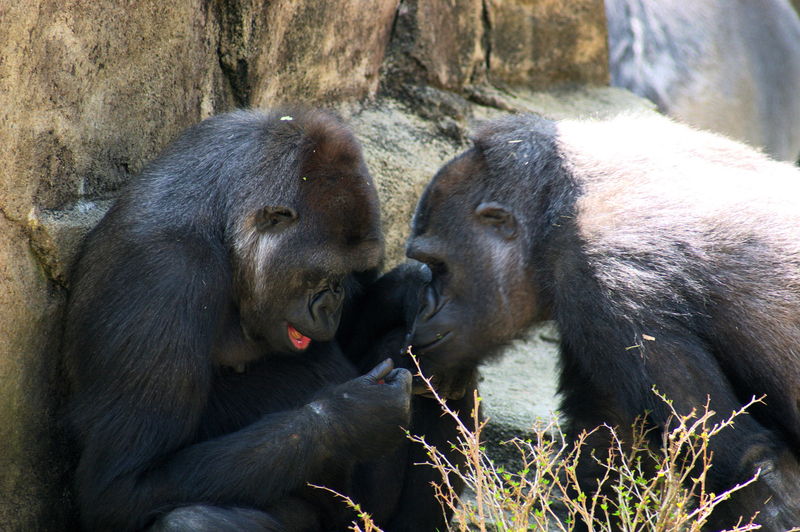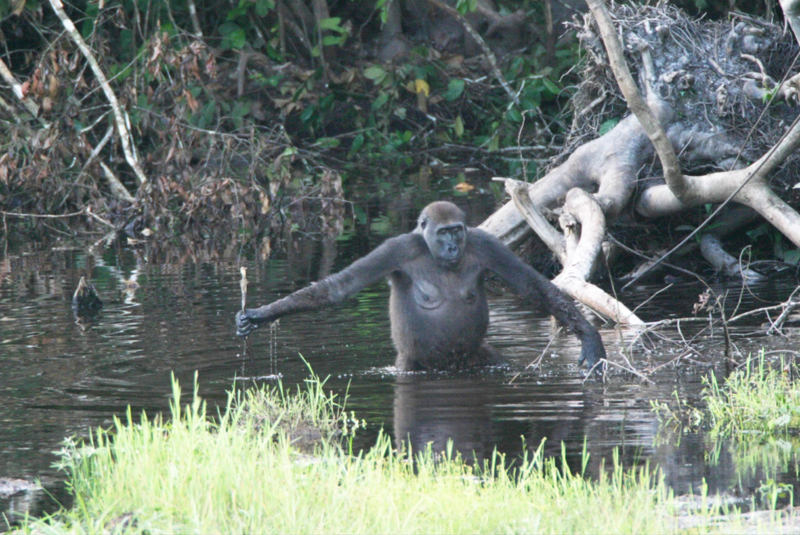Intelligent
Behavior:

Despite
their large size, the Western Gorilla is normally a relatively gentle
and quiet animal. They usually live in groups consisting of a
single mature silverback and four to six adult females and their young.
Individuals communicate with eachother using a variety of
vocalizations, including purrs, grunts, which show contentment,
screams,and
high barks, which reveal curiousity. Silverbacks also communicate with
their opponents over long distances using loud hooting noises. 7
Western
Gorillas are active
during the day and will travel anywhere from 300 to 6000 feet per day
with their group. Each evening, the gorillas will build a new nests on
the ground or in trees; they tend to sleep for about 12 hours of the
day. They are not territorial, but troops try to avoid eachother and
other
large animals sharing their habitat. They are typically not aggressive,
but silverbacks will defend their groups if a lone male attempts to
take over his group. This is done by standing bipedally, beating on the
chest, roaring, and charging to intimidate the opponent; there is
usually not physical damage to the gorillas during these "fights." 7

The
Western Gorilla is a highly intelligent creature, which has been shown to be capable of
exhibiting several behaviors previously thought to be exclusive to
humans. Dr. Francine Patterson of The
Gorilla Foundation has been working with Koko, a Western
Lowland Gorilla, since 1971 as a project in interspecies communication.
Dr. Patterson has taught Koko, along with her late companion Michael, a
version of American Sign Language (ASL). Koko knows over 1000 signs,
understands over 2000 spoken words, and makes up her own innovative
phrases to describe things, such as "finger-bracelet" to describe a
ring. 10,12
Koko also
revealed to the world that gorillas can show compassion. Many years
ago, Koko expressed her desire to have a kitten; Dr. Patterson
hesitantly complied, and Koko treated her tiny kitten, which she named
"All Ball," like a baby. She would hold All Ball very gently on her lap
and carry it on her back. Even when the young kitten bit her, Koko did
not get mad or strike out at it, she simply signed, "Cat bite.
Obnoxious." Koko also signed that she loved her kitten. Unfortunately,
All Ball got out one day and was hit by a car; Koko did not respond at
first, but minutes later Dr. Patterson heard Koko vocalizing in long
hoots, an indication of sadness. When asked about her cat later, Koko
signed, "Sleep cat," and "Cry, sad, frown." Since that time, Koko has
helped care for other kittens and even held a baby belonging to one of
the employees at The Gorilla Foundation. Koko also enjoys painting and
her works have received praise by art critics. 10,12,13
A Western
Lowland Gorilla who lives at Brookfield Zoo in Illinois, Binti Jua, also showed
great compassion a few years ago when a three-year-old boy fell into
her enclosure at the zoo. Binti Jua, who happens to be Koko's niece,
carefully picked up the unconscious boy and carried him to an area
where zookeepers could reach him, warding off another larger female on
the way; the entire time, Binti Jua's own infant was
on her back. 10,12
Learn more about how the Western Gorilla raises its young here.

Western
Gorillas have long been known to use tools in captivity. In
2004, however, the first documented instances of tool use in wild
individuals were observed. In a swampy area, one female, shown at
right, pulled a branch from the edge of a pool and then entered the
water walking bipedally. She proceeded to use the branch to prod
the water in front of her to test its depth; she also used the branch as a
walking stick for support while she maneuvered through the pool. A
different female gorilla was later observed in the same area using a
large branch to stabilize herself while processing food. 2
--------------------------------------------------------------------------------------------------------------------------------------------------------------------------------------------------------------------------------------------------------------------------
Site
designed by Arika Wussow, Last updated April 2008.



